Translational Research Scholars
The School of Medicine’s Program to Advance Physician Scientists and Translational Research (TRSP) is pleased to announce that seven junior faculty from across the School of Medicine have been named the 2023 Translational Research Scholars. These outstanding investigators were selected from a large number of highly competitive applications from across the School of Medicine. This award includes funds to support the Scholars’ innovative translational research as well as ongoing mentorship and career development. The Program aims to foster translational research among the School’s early career faculty, allowing them to expand the scope of their research into new lines of exploration.
The TRSP is led by David Schwartz, MD, Distinguished Professor of Medicine and Immunology and Director of the School of Medicine Program to Advance Physician Scientists and Translational Research, and Sean Colgan, PhD, Levine-Kern Professor of Medicine and Immunology in the Division of Gastroenterology. In its second year, the Program now supports 18 Scholars from 6 departments in the School of Medicine.
The TRSP awards will provide each Scholar with up to $300,000 for their research over the four year award. The Program’s next call for applications will be in the fall of 2023. The Program is open to early career faculty from across the School of Medicine who are within the first four years of their Assistant Professor appointment.
2023 Translational Research Scholars
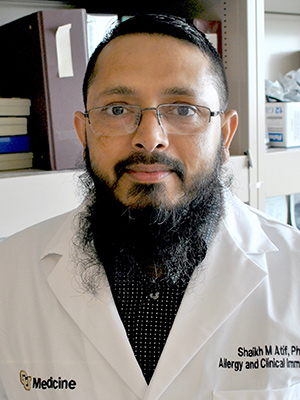
Shaikh M. Atif, PhD
Assistant Professor
Department of Medicine
Division of Allergy and Clinical Immunology
Dr. Shaikh Muhammad Atif completed his MSc and Ph.D. in Biotechnology at Aligarh Muslim University in Aligarh, India. He did his postdoctoral training at the University of California Davis and National Jewish Health, where his studies were focused on host-pathogen interactions, transplant rejection, cancer immunology, and characterization of mononuclear phagocytes in human lungs and lung-draining lymph nodes. In 2018, Dr. Atif joined the Department of Medicine at the University of Colorado. His research laboratory primarily focuses on investigating the immunopathology of granulomatous lung diseases (chronic beryllium disease (CBD) and sarcoidosis). By understanding the underlying cellular and molecular mechanisms of these diseases, Dr. Atif's lab aims to contribute to the development of improved diagnostic tools and targeted therapies for patients suffering from inflammatory lung diseases. His research is currently supported by a foundation grant and an NIH R01 grant.
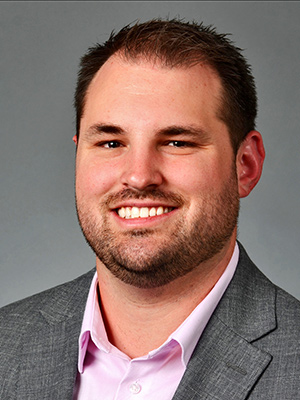
Ian Cartwright, PhD
Assistant Professor
Department of Medicine
Division of Gastroenterology and Hepatology
Rocky Mountain Regional VA
Dr. Ian Cartwright earned his BS, MS, and PhD in Toxicology from Colorado State University. Before starting his own lab, Ian was a postdoctoral fellow at Duke University (2014-2016) and the University of Colorado Anschutz Medical Campus (2016-2021) were his research focused on dissecting molecular mechanisms involved in tumorigenesis and transformation. Dr. Cartwright’s research currently focuses on understanding how neutrophil/epithelial cell interactions mold the inflammatory microenvironment and how we can leverage these interactions to promote the resolution of inflammation. More specifically, Dr. Cartwright is interested in understanding the role of neutrophil-derived myeloperoxidase in molding the inflammatory microbiota and immune cell recruitment. The ultimate goal of his work is to identify novel therapeutic targets for the treatment of Inflammatory Bowel Disease. Dr. Cartwright’s lab is funded by a Veterans Affairs Career Development Award.
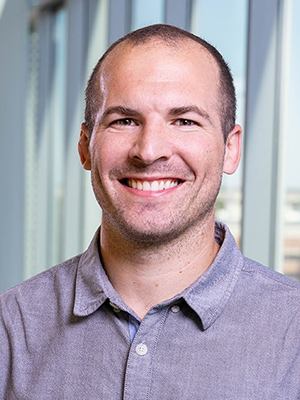
Seth Creasy, PhD
Assistant Professor
Department of Medicine
Division of Endocrinology, Metabolism, and Diabetes
Dr. Seth Creasy received his PhD in Exercise Physiology from the University of Pittsburgh under the mentorship of Dr. John Jakicic. His training at the University of Pittsburgh focused on behavioral modification strategies to enhance adherence to dietary and physical activity recommendations for treating obesity. He then obtained his postdoctoral training in energy metabolism at the University of Colorado Anschutz Medical Campus working under the mentorship of Dr. Edward Melanson. His postdoctoral fellowship was funded by the NHLBI (T32) and NIDDK (F32). In 2019, Dr. Creasy received an NHLBI Career Development Award (K01) focused on understanding how the timing and consistency of sleep, food intake, and physical activity behaviors influence bodyweight regulation. Dr. Creasy is currently an Assistant Professor of Medicine at the University of Colorado Anschutz Medical Campus, and he is the Assistant Director of the Doubly Labeled Water Core. Most recently, Dr. Creasy’s work has focused on examining time-dependent benefits of aerobic exercise – specifically in the area of weight management. The overarching goal of this work is to better understand the metabolic benefits of exercising at different times of the day so that exercise prescriptions can be tailored to elicit the optimal metabolic response, which may be disease specific.
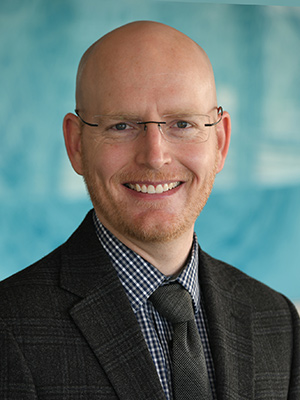
Nathan A. Dahl, MD
Assistant Professor
Department of Pediatrics
Division of Hematology, Oncology, and Bone Marrow Transplantation
Dr. Nathan Dahl is an Assistant Professor of Pediatrics at the University of Colorado School of Medicine and an attending physician in the Pediatric Neuro-Oncology Program within the Center for Cancer and Blood Disorders at Children’s Hospital Colorado. He received his medical doctorate from the University of Nevada School of Medicine before completing pediatrics residency at Cincinnati Children’s Hospital. He then joined the University of Colorado for fellowships in pediatric oncology and pediatric neuro-oncology. As part of the Morgan Adams Foundation Pediatric Brain Tumor Research Program, the Dahl lab now studies epigenetic regulation of chromatin and transcription in childhood brain tumors, with a focus on diffuse intrinsic pontine glioma and other high-grade gliomas. The TRSP supports the translational goals of this research, with active efforts underway to move the findings from his work into a first-in-pediatrics clinical trial for children with incurable brain cancer.
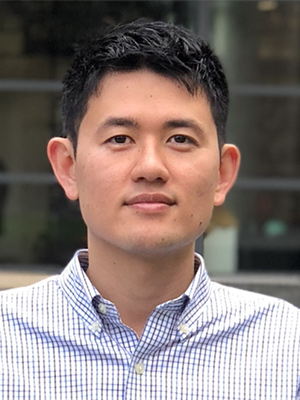
Edward Lau, PhD
Assistant Professor
Department of Medicine
Division of Cardiology
Dr. Edward Lau is an Assistant Professor in the Department of Medicine, Division of Cardiology and the Consortium for Fibrosis Research and Translation at the University of Colorado Anschutz Medical Campus. His lab uses proteomics and bioinformatics methods to study how the function of proteins is regulated by their spatial and temporal dynamics, and how the disruption of protein homeostasis contributes to aging and diseases. For the TSRP-funded project, his team will pilot new single-cell technologies to study the underlying causes of cardiomyopathy. Prior to joining our campus, Edward obtained his bachelor’s degree at the University of California Berkeley, his PhD at the University of California Los Angeles, followed by an NRSA postdoctoral fellowship at Stanford University. His lab is currently funded by an NIH/NHLBI K99/R00 Pathway-to-Independence award, an NIH/Office of the Director Common Funds Data Ecosystem R03 grant, and an NIH/NIGMS R35 Maximizing Investigators' Research Award (MIRA).
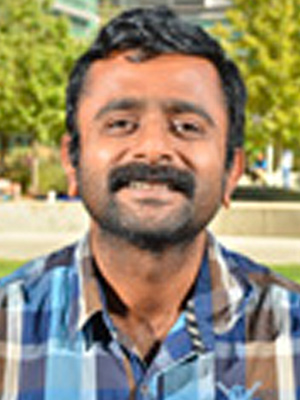
Fredrick Rosario-Joseph, PhD
Assistant Professor
Department of Obstetrics and Gynecology
Division of Reproductive Sciences
Dr. Fredrick Rosario-Joseph is an Assistant Professor in the Division of Reproductive Sciences, Department of Obstetrics and Gynecology. He earned his postdoctoral fellowship at the University of Texas Health Science Center in San Antonio under the mentorship of Dr. Thomas Jansson and Dr. Theresa Powell. Dr. Rosario’s lab interest involves elucidating the cellular and molecular mechanisms regulating placental nutrient transport and investigating the role of placental factors (secretome/miRNAs) in regulating fetal growth and placental-fetal programming in various pregnancy complications such as IUGR, obesity, and GDM.
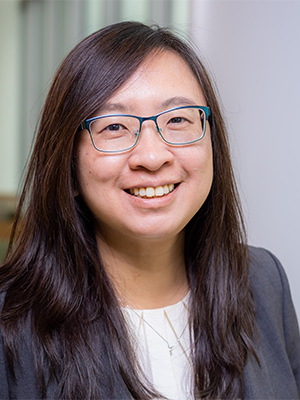
Fan Zhang, PhD
Department of Medicine
Division of Rheumatology
Department of Biomedical Informatics Center for Health Artificial Intelligence
Dr. Fan Zhang and her lab are at the intersection of the Department of Medicine Division of Rheumatology and the Department of Biomedical Informatics Center for Health Artificial Intelligence. Before starting her own lab, Dr. Zhang did her Postdoc research in computational and statistical method development for large-scale single-cell immunogenomics at Harvard Medical School and the Broad Institute of Harvard and MIT. She is an Investigator in the NIH NIAMS/NIAID-funded AMP RA/SLE (Accelerating Medicines Partnership Rheumatoid Arthritis and Systemic Lupus Erythematosus) and AMP AIM (Autoimmune and Immune-Mediated Diseases) consortiums. Dr. Zhang recently received the PhRMA (Pharmaceutical Research and Manufacturers of America) Foundation grant and the ANRF (Arthritis National Research Foundation) grant. The Zhang lab (fanzhanglab.com) currently develops novel big data-driven AI methods for computational omics and systems immunology to study inflammatory disease pathogenesis for translational medicine.
| CONTACT US |
David Schwartz, MD |
Jennifer Kemp, PhD |
| Paul Wood, MA Program Manager Paul.Wood@cuanschutz.edu |
| Sarah Miller Business Coordinator sarah.h.miller@cuanschutz.edu |